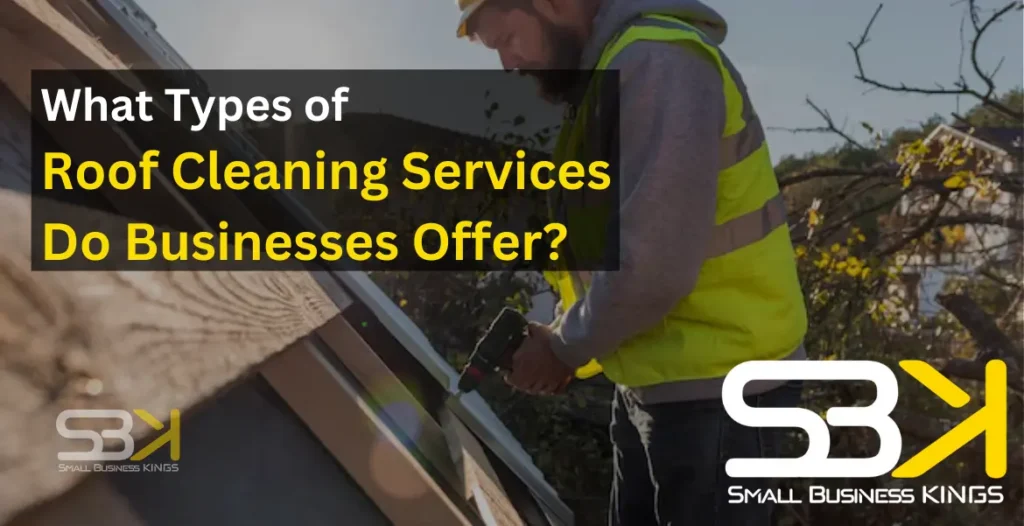Maintaining a clean roof is vital for both residential and commercial properties. Roofs are constantly exposed to harsh weather conditions, leading to the buildup of dirt, moss, algae, and debris. As time passes, this accumulation can result in serious issues like leaks and deterioration, potentially leading to expensive repairs.
In fact, a report by the National Roofing Contractors Association (NRCA) shows that proper roof maintenance can extend a roof’s lifespan by 20% to 30%. Roof cleaning also boosts curb appeal, which is particularly important for businesses seeking to attract customers.
Whether for aesthetic purposes or functional benefits, businesses can offer various roof cleaning services tailored to different roof types, including pressure washing, soft washing, and eco-friendly options. Understanding which method suits a specific property is crucial for effective cleaning and maintenance, making professional roof cleaning services an essential investment.
Types of Roof Cleaning Services
1. Pressure Washing
Pressure washing is a widely used method for cleaning roofs, particularly effective on durable surfaces like ceramic tiles and metal roofs. The process involves blasting high-pressure water onto the roof to remove dirt, debris, moss, and stains. It offers fast and efficient results, making it a go-to choice for cleaning tougher contaminants.
However, it’s important to exercise caution when applying this technique to older or more delicate roofs. The intense pressure can potentially damage fragile roofing materials, leading to cracks or causing water to seep beneath shingles, which may result in leaks.
Therefore, businesses providing pressure washing services should carefully assess the roof’s condition before proceeding. Ensuring the right application of pressure is crucial to avoid any unintended damage and to provide the best cleaning solution for each specific roof type.
2. Soft Washing
Soft washing is a more delicate roof cleaning method that combines low-pressure water with specialized cleaning solutions. This technique is especially suited for fragile materials like asphalt shingles, wood, slate, and roofs affected by algae or moss growth. Unlike pressure washing, soft washing provides a gentler approach that effectively removes algae, moss, and lichen while protecting the roof’s surface.
One of the main benefits of soft washing is that it’s much safer for delicate roofing materials, ensuring no damage is done. Additionally, the results tend to last longer, as the cleaning solution helps prevent the regrowth of unwanted debris. However, a potential downside is the use of chemical cleaners, which may raise environmental concerns for some homeowners.
Despite this, soft washing remains a popular service for businesses catering to clients with more fragile roofs or those looking for a thorough, long-lasting clean without the risk of damage.
3. Manual Cleaning
Manual roof cleaning involves using hands-on techniques such as scraping, brushing, and scrubbing with specialized tools like brooms or cloths. This labor-intensive method is typically employed when dealing with stubborn stains, delicate roofs, or areas that require more focused attention. It’s ideal for roofs with intricate designs or small-scale cleaning tasks where precision is crucial.
The tools used in manual cleaning, such as hand scrapers, brushes, and soft cloths, help avoid causing any damage like scratches or dents, making it a safer option for fragile surfaces. While this method takes more time and effort compared to others, It enables professionals to take a more tailored approach to cleaning, ensuring each section of the roof receives careful attention and proper treatment.
4. Chemical Cleaning
Chemical roof cleaning involves using specialized chemicals to break down organic growth such as moss, algae, and mold that can accumulate on the roof surface. This method is particularly effective when other cleaning techniques are less successful in removing stubborn growths. Common chemicals used include biocides, chlorine bleach, and more eco-friendly alternatives.
These treatments can quickly tackle difficult issues, offering a powerful solution for roofs that have heavy organic build-up. However, it’s crucial to consider the environmental impact of these chemicals, as they can harm surrounding vegetation and the ecosystem if not applied carefully.
To address environmental concerns, many businesses now offer eco-friendly chemical cleaning options, ensuring a balance between effective cleaning and environmental responsibility. Offering these alternative solutions can help businesses appeal to clients who prioritize sustainability without compromising on roof cleanliness.
5. Eco-Friendly Roof Cleaning
Eco-friendly roof cleaning has gained popularity as more homeowners and businesses seek environmentally responsible alternatives to traditional cleaning methods. This approach uses biodegradable, non-toxic cleaning solutions that are safe for both the environment and the surrounding areas, including landscaping and pets.
Common eco-friendly solutions include natural agents like vinegar, baking soda, and citrus-based cleaners, as well as non-toxic, biodegradable detergents. The primary benefit of eco-friendly roof cleaning is its ability to preserve the health of plant life and prevent contamination of runoff water.
For businesses focusing on sustainability, offering eco-friendly cleaning services is an excellent way to attract environmentally-conscious clients and differentiate themselves in a growing green market. This method not only supports cleaner roofs but also aligns with the increasing demand for more responsible and sustainable service options.
6. Specialized Services
Gutter Cleaning
Gutter cleaning is an essential service that complements roof cleaning, as clogged gutters can lead to water pooling on the roof and cause leaks or structural damage. Businesses offering gutter cleaning can use a variety of tools such as gutter vacuums, pressure washers, and hand tools to effectively remove debris and ensure proper water flow.
By adding gutter cleaning to their services, companies can provide a more comprehensive maintenance solution, helping clients avoid future roof issues and enhancing their overall service offering.
Moss and Algae Removal
Moss and algae growth on roofs can lead to significant damage if not addressed. These organic growths trap moisture, which can weaken roofing materials and cause leaks. To remove moss and algae, professionals use a combination of chemical treatments, manual scraping, or soft washing.
Regular removal is crucial to extending the roof’s lifespan, preventing moisture buildup, and avoiding costly repairs in the long run. This service helps maintain the roof’s structural integrity and overall condition.
Solar Panel Cleaning
As solar panel usage grows, maintaining their efficiency becomes crucial. Dust, debris, and algae buildup can reduce the effectiveness of solar panels, making regular cleaning necessary. Solar panel cleaning services often use soft washing or specialized tools to gently remove debris without causing damage.
This ensures the panels operate at peak performance, improving energy efficiency and maximizing savings for homeowners and businesses alike. Offering solar panel cleaning is a valuable addition for businesses looking to cater to the needs of solar system owners.
7. Commercial vs Residential Roof Cleaning
Commercial roof cleaning is essential for maintaining large roof structures in businesses and industrial buildings. These roofs face exposure to pollutants like dirt, debris, and chemicals, which can cause wear and tear.
Professional cleaning methods such as pressure washing, soft washing, or chemical treatments are used to remove contaminants and protect the roof’s integrity. Regular cleaning helps maintain the property’s appearance, ensures safety, and extends the roof’s lifespan, making it crucial for business owners.
Residential roof cleaning focuses on homes and smaller properties, where roofs accumulate dirt, algae, moss, and debris. Gentler methods like soft washing and eco-friendly solutions are often used to prevent damage to delicate materials.
Regular cleaning enhances curb appeal, prevents mold, moss buildup, and leaks, and ensures a durable roof. Offering this service adds value to homes and helps homeowners maintain a well-kept roof.
Choosing the Right Service
When selecting a roof cleaning service, it’s important to assess the type of roof, its condition, and the specific needs of the property. Roof types like asphalt shingles, metal, or tile may require different cleaning techniques to avoid damage. Consulting professionals is key to choosing the right cleaning method.
Conclusion
In conclusion, businesses that offer roof cleaning services provide a wide array of options designed to meet the needs of various roof types and conditions. From pressure washing to eco-friendly solutions, each cleaning method has its benefits and drawbacks.
Regular roof cleaning not only improves the look of a property but can also increase its lifespan. By offering multiple types of cleaning services, businesses can cater to a broader range of clients and ensure they’re providing the best possible care for their roofs.
FAQs
- What is the best method for cleaning an asphalt shingle roof?
Soft washing is the best option as it’s gentle and effective at removing algae and moss without damaging the shingles. - How often should I have my roof cleaned?
It’s recommended to have your roof cleaned at least once every 1-2 years, depending on the climate and surrounding environment. - Can roof cleaning damage my roof?
If done improperly, yes. High-pressure washing or harsh chemicals can damage delicate roof surfaces. Always consult a professional before cleaning. - Is eco-friendly roof cleaning effective?
Yes, eco-friendly roof cleaning can be just as effective as traditional methods, particularly when it comes to algae and moss removal. - Do I need to clean my gutters when cleaning my roof?
Yes, cleaning gutters along with your roof is essential to prevent water damage and ensure proper drainage.




